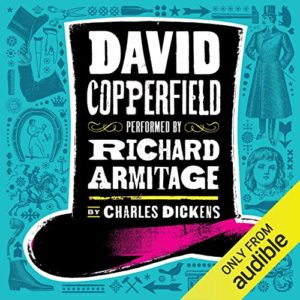This past month I read To Bless the Space Between Us by John O’Donohue, as part of Tweetspeak’s June book club. In the introduction, he writes:
A blessing is a difficult form to render. I have endeavored to write them as poetically as possible, but they are not poems. … In contrast, the blessing form has an eye to the outside in order to embrace and elevate whatever is happening to someone.”
Because I’ve been a devoted listener to Harry Potter and the Sacred Text, I am in the habit of creating blessings for fictional characters — especially those whom I do not like. In an effort to follow O’Donohue’s advice to “embrace and elevate,” I resolved to bless David Copperfield’s wife, Dora. Because bless her heart. I did not like her when she made her silly little entrance, doting on her dog, Jip. But as long as I remained annoyed with her, I was essentially “following the wrong god home” and missing the brightness that is her “star.”
* Spoilers ahead for this 170-year-old story. *
Dickens writes women well. Each female in this long tome is worthy of her own fanfic. However, David’s marriage to Dora is rendered in two chapters, both titled “Another Retrospect.” As in, “Let me sum up.” But as I searched for a way to bless Dora, I found Dickens had left me an opening: Agnes.
Agnes is a sister of sorts to David and his confidante. Dora is nervous to meet her, sensing that Agnes is probably better suited to David than she is. (She’s right.) But the two women become friends. A she lies dying, Dora solemnly charges Agnes “that only [Agnes] would occupy this vacant place.” Meaning that the only person who should wed David after Dora dies is Agnes. She also tells David that she would have probably been a much better woman if she’d known Agnes earlier.
I’m afraid, dear, I was too young. I don’t mean in years only, but in experience and thoughts and everything. I was such a silly little creature. And I’m afraid it would have been better if we had only loved each other as a boy and girl and forgotten it. I have begun to think I was not fit to be a wife.”
Self-awareness, thy name is Dora.
My other clue that there is something more to Dora occurs when David seeks the counsel of his aunt — the glorious Betsey Trotwood — following a prolonged quarrel between him and Dora. Aunt Betsey won’t interfere. She calls Dora “Blossom,” recognizing her fragility. And that’s when it hit me: Aunt Betsey called David’s mother by another affectionate name, “Baby.” David, sir, you married your mother. Which is less Freudian than familiar — you know what you know.
But “Baby” proves herself to be brave and hopeful amid terrible hardships. And “Blossom” might have shown herself to be the hardiest of flowers if anyone (including David) allowed her to have to endure any sort of trial, ever.
Finally, I bless Dora for eliciting from David the most pure and unabashed love.
When David falls for Dora, he falls completely. There is no reason given. The chapter is titled “I Fall into Captivity,” and here is what he says when he meets her:
All was over in a moment. I had fulfilled my destiny. I was a captive and a slave. I loved Dora Spenlow to distraction. … I was swallowed up with an abyss of love in an instant. There was no pausing on the brink, no looking up or looking back. I was gone, headlong, before I had sense to say a word to her.”
David’s love for Dora makes no sense. It just is. We’re told later that she’s very pretty, but her prettiness is not given as the reason for his love. In many ways the two are ill-suited to each other. But David loves her. He tries to improve her, and she won’t be improved. David still loves her. He experiences several deaths in this book, but none affect him as much as Dora’s. When she dies, he leaves England … for three years.
Dearest Dora, you were not loved for things about you. You were loved recklessly by someone who tumbled headlong into your sunny abyss and never crawled out. May you blossom forever.
Your turn
1. What fictional character has vexed you? How might you bless them?
2. If you do bless a character you don’t like, how does that blessing impact your understanding of the story?
3. Share your June pages. Sliced, started, and abandoned are all fair game.
June’s Pages
Poetry
To Bless the Space Between Us, John O’Donohue
Adult
Fun Home: A Family Tragicomic, Alison Bechdel (memoir/graphic novel)
In the Great Green Room: The Brilliant and Bold Life of Margaret Wise Brown, Amy Gary
God’s Secretaries: The Making of the King James Bible, Adam Nicholson
Walk With Us: How The West Wing Changed Our Lives, Claire Handscombe
Early Readers and Picture Books
Wave, Suzy Lee (Join us for Children’s Book Club, Friday, July 10!)
Another Important Book, Margaret Wise Brown, illus. Chris Raschka
Baby Animals, Margaret Wise Brown, illus. Susan Jeffers
Bumble Bugs and Elephants, Margaret Wise Brown, illus. Clement Hurd
Big Red Barn, Margaret Wise Brown, illus. Felicia Bond
Good Day, Good Night, Margaret Wise Brown, illus. Loren Long
Little Donkey Close Your Eyes, Margaret Wise Brown, illus. Ashley Wolff
The Little Scarecrow Boy, by Margaret Wise Brown, illus. David Diaz
A Pussycat’s Christmas, Margaret Wise Brown, illus. Anne Mortimer
Wait Till the Moon Is Full, Margaret Wise Brown, illus. by Garth Williams (my favorite of the Margaret Wise Brown bunch)
Middle Grade and YA
Hamster Princess: Harriet the Invincible, Ursula Vernon (a hip hamster version of Sleeping Beauty)
Made Progress
Uncle Tom’s Cabin, Harriet Beecher Stowe
Photo by antonio, Creative Commons, via Flickr. Post by Megan Willome.
Browse more from A Ritual to Read to Each Other
“Megan Willome’s The Joy of Poetry is not a long book, but it took me longer to read than I expected, because I kept stopping to savor poems and passages, to make note of books mentioned, and to compare Willome’s journey into poetry to my own. The book is many things. An unpretentious, funny, and poignant memoir. A defense of poetry, a response to literature that has touched her life, and a manual on how to write poetry. It’s also the story of a daughter who loses her mother to cancer. The author links these things into a narrative much like that of a novel. I loved this book. As soon as I finished, I began reading it again.”
—David Lee Garrison, author of Playing Bach in the D. C. Metro
- Perspective: The Two, The Only: Calvin and Hobbes - December 16, 2022
- Children’s Book Club: A Very Haunted Christmas - December 9, 2022
- By Heart: ‘The night is darkening round me’ by Emily Brontë - December 2, 2022



Glynn says
I’m too conventional. I generally get vexed by villains, like Uriah Heep, or James Steerforth. Although I admit I did find Dora a bit aggravating (I remember rooting for Agnes when I first read the novel). I will have to try the blessing approach.
June reading:
Mystery
The Pardoner’s Tale by Keith Moray
The Gracie Allen Murder Case by S.S. Van Dine
The Spanish Villa Mystery by Roy Lewis
The Winter Murder Case by S.S. Van Dine
Murder to Music by Margaret Newman
The Return of Mr. Campion: Stories by Margery Allingham
Non-fiction
The Music of Time by John Burnside
Tough Issues, True Hope by Luke H. Davis
Alias S.S. Van Dine by John Loughery
Shakespeare of London by Marchette Chute
Poetry
Holding Company by Major Jackson
Fiction
Moose Be Love by Jacqueline Winter
Until June by Barbara Britton
Dancing Prince by me – three reads of the final proof copy
Megan Willome says
An emotional final three reads, I’m sure, Glynn.
I have known Steerforths and Heeps and Murdstones. Villains require so much of you as a reader, if not to outright empathize, at least to feel sympathy or a shred of understanding toward. Plus I love a good villain.
But struggling to find a blessing for Dora reshaped my understanding of the story. I still want Agnes for my best friend, but her relationship with David now leaves me kinda cold.
My favorite character, though, is Mr. Peggotty.
Maureen says
Having finished what was on last month’s list, including ‘Not By the Sword’, I added Jericho Brown’s ‘The Tradition’ and Ellen Bass’s ‘Indigo’. I also completed my parish’s book club selection and discussing of ‘Living Faith’ (the book’s not very good but the discussion throughout June was excellent).
Currently, I am reading Sue Monk Kidd’s ‘The Book of Longings’, Tommy Orange’s ‘There There’, and Michelle McNamara’s ‘I’ll be Gone in the Dark: One Woman’s Obsessive Search for the Golden State Killer.’ My plans also are to finish Philiip Metre’s wonderful ‘Shrapnel Maps’.
Megan Willome says
Maureen, I’m so glad you brought up the benefits of a good book club discussion, that it can elevate even a book you don’t care for.